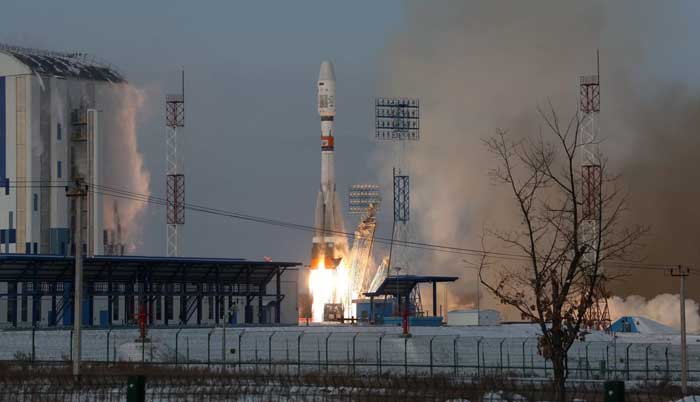![]() Home > Space & Science
Home > Space & Science
Russia Lost A $45 Million Weather Satellite Due To Human Error, Official Says

A Russian Soyuz rocket launches the Meteor-M No. 2-1 weather satellite from the Vostochny Cosmodrome in eastern Russia on Nov. 28, 2017. The satellite, along with 18 others, was lost due to a programming error, Russian space officials said. Credit: Roscosmos
![]() January 4th, 2018 | 09:59 AM |
January 4th, 2018 | 09:59 AM | ![]() 1285 views
1285 views
SPACE.COM
The loss of a $45 million Russian weather satellite last November was due to human error, a high-ranking official said, because the satellite's programming was set for the wrong launch site.
Russian Deputy Prime Minister Dmitry Rogozin told Russian state television that the programming for the satellite, called Meteor-M No.2-1, included instructions based on the satellite launching from the Baikonur Cosmodrome in Kazakhstan, east of Russia. Baikonur is a frequent launch site for satellites and astronauts. However, Meteor-M launched from the new Vostochny launch site in eastern Russian.
"The rocket was really programmed as if it was taking off from Baikonur," Rogozin said in remarks reprinted in The Guardian last week. "They didn't get the coordinates right."
The Soyuz-2.1b rocket – carrying Meteor-M and several other satellites – appeared to lift off normally from Vostochny Nov. 28. Shortly after launch, however, Russian state space corporation Roscosmos said it could not communicate with Meteor-M because the satellite was in the wrong orbit.
Canadian operator Telesat said later that day that the launch had failed. Telesat was carrying a prototype satellite for a low-Earth orbit broadband constellation on the same Soyuz rocket. It added that the launch failure would not delay the long-term plans of the constellation.
"Notwithstanding this failure, Telesat's plans to develop a state-of-the-art, high capacity LEO constellation that will deliver transformative, low latency, fiber-like broadband to commercial and government users worldwide, remain on track," the company said in November.
Soyuz carried 19 satellites during the failed launch. Other customers on the flight included Spire (10 weather and ship-tracking data cubesats), Astro Digital (two Earth-imaging cubesats) and Astroscale (which launched a small satellite to measure orbital debris.)
Vostochny, which is about 3,500 miles (5,500 kilometers) east of Moscow, was under construction for five years before its first launch on April 28, 2016. Russia plans to use this new facility to reduce its dependence on Baikonur, according to The Atlantic. Meteor-M's Soyuz rocket was only the second one launched from Vostochny, according to Spaceflight Now.
Baikonur was constructed when Kazakhstan was a part of the Soviet Union; it hosted the first satellite launch (Sputnik 1) in 1957 and the first human launch of Yuri Gagarin in 1961. Since the Soviet Union broke up, Russia has been leasing the facility from Kazakhstan. (The lease price alone was $115 million annually as of 2013, with an additional $50 million for yearly maintenance.)
Baikonur is the only site for astronaut and cosmonaut launches to the International Space Station since the U.S. space shuttle retired in 2011. NASA is developing U.S. commercial spaceflight alternatives with SpaceX's human-rated Dragon spacecraft and Boeing's CST-100 spacecraft. Both Dragon and CST-100 are scheduled for test launches later this year.
Source:
courtesy of SPACE
by Elizabeth Howell
If you have any stories or news that you would like to share with the global online community, please feel free to share it with us by contacting us directly at [email protected]